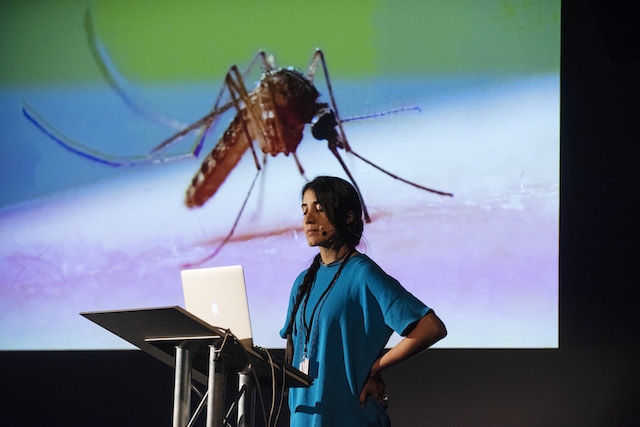I first heard of Vivian Caccuri’s work while working on General Ecology, an ongoing project that explores complexity, interspecies questions and the environment through ecological worldviews and systems, at the Serpentine Galleries in London. With sound experimentation at its core, Caccuri’s art investigates the bodily, affective and sociopolitical dimensions of the medium, looking at how the history of specific sounds is packed into a dense tangle of hegemonic signifiers. In many of her works, these histories – banned music, forbidden bodies, the intimate connection of dance and revolt – are transformed into embodied experience, within which sound becomes material, palpable.
Caccuri’s performance-lecture Mosquitos Also Cry (2018) reflects on the sound of a mosquito’s flight, and how its characterisation as bothersome or threatening belongs to a wider colonial narrative around hygiene and population control. This research, currently ongoing, also manifests in the installation Água Parada (Still Water, 2018). Its title is a reference to the role of the mosquito (which breeds in still water) in the spread of dengue fever, and the work comprises a mosquito net, a series of mosquito-attracting lights and a composition in which the sound and wingbeat frequencies of different species of mosquitoes have been mixed into an appropriately infectious dance track. Far from following a single art-historical lineage, Caccuri’s work hovers on that compelling edge between visual art, experimental music and anthropology, which I believe to be the key place from which to consider together extremely complex and entangled systems and conditions – namely ecology, interspecies relationships and the legacies of globalisation and colonial violence. Anthropologist Anna Tsing refers to ‘feral proliferations’ as those unintended and unstoppable consequences of the settler-capitalist project’s structures of order and control. In Caccuri’s work, these consequences are brought right back into your senses, under your skin.
Vivian Caccuri lives and works in Rio de Janeiro. Her recent solo exhibitions were Condominium at Galeria Leme, São Paulo (2015), and It’s in the Mind at Progetti Gallery, Rio de Janeiro (2013). Group exhibitions include Future Generation Art Prize at Palazzo Contarini Polignac, Venice; The Atlantic Triangle at Rele Gallery, Lagos, and Sugar and Speed at MAMAM, Recife (all 2017). She presented work at the 32nd São Paulo Biennial and won the Pinchuk Future Generation Art Prize in 2017.
Lucia Pietroiusti is Curator of General Ecology at the Serpentine Galleries, London. Currently she is producing and co-curating (with Filipa Ramos) a durational symposium titled ‘The Shape of a Circle in the Mind of a Fish’, which explores interspecies consciousness. In 2019 Pietroiusti will curate the Lithuanian Pavilion at the Venice Biennale, featuring a new performance work by Rugile ̇Barzdžiukaite, Vaiva Grainyte and Lina Lapelyte.
From the January and February 2019 issue of ArtReview, in association with K11 Art Foundation
